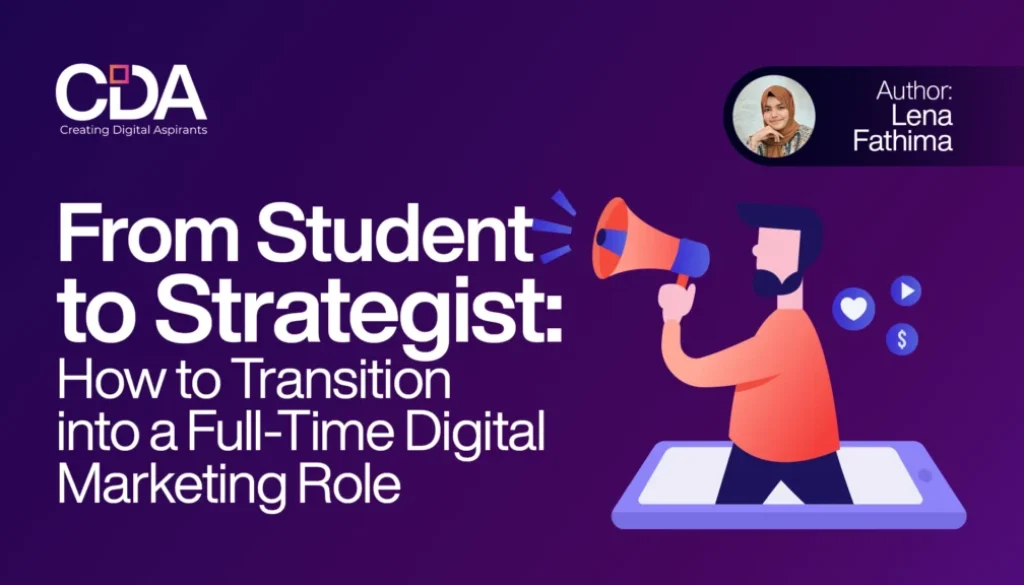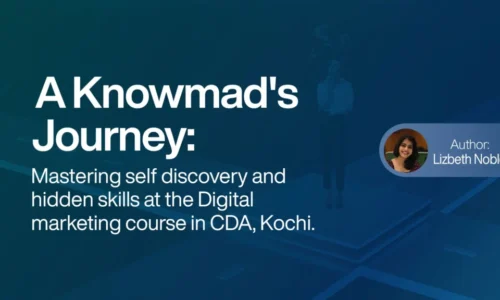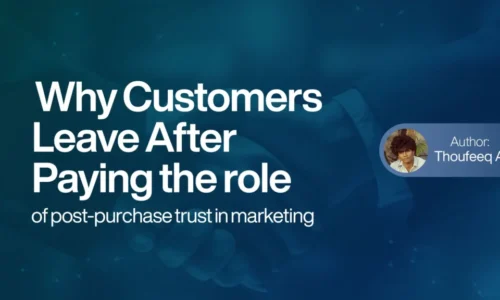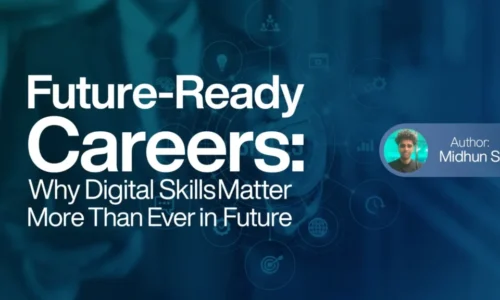From Student to Strategist: How to Transition into a Full-Time Digital Marketing Role
This is one of those jumps that can sound pretty intimidating, from being a student to being a full-time digital marketing professional: it’s all achievable when done the proper way. So if you’re interested in digital marketing, there’s certainly much you can do to get ready for this exciting journey. Learn how you can transition into a full-time digital marketing role and become the strategist you aspire to be.
Table of Contents

1. Learn Beyond the Classroom
Formal education is a good basis for actual practice in digital marketing, but it’s much more than what one learns from textbooks. You should look at resources like free e-books, follow and analyze the tracks of trends in the industry, and play around with different marketing tactics.
There are many free online training platforms that offer training and certifications in digital marketing, SEO, social media management, and others. Out of all these, courses offered by Google Digital Garage, HubSpot Academy, and Coursera are really great and available to complete 100% at your own pace.
These certifications not only increase your skills but also add value to your resume while you are applying for jobs.Also, you can find really good input through blogs and articles by successful marketers. For example, Neil Patel’s blog, Moz, and Search Engine Journal are just some of the websites that are rich in perspectives on how this digital marketing world is constantly shifting.
2. Build a portfolio
A good portfolio, especially in first-time, full-time jobs,it is essential as employers want to be able to see the immediate practical evidence of what you can do rather than just knowing theoretically. If you don’t have paid projects yet, it’s okay. Work on your own initiatives or volunteer for small businesses, non-profits, or student organizations.
Here are a few ways you can start building your portfolio:
Establish your own blog or website, applying SEO techniques to drive and expand the traffic it receives,Maintain social media pages for clubs or local organizations,
Help small businesses in your locality.
As you gain experience, note the outcomes achieved. For example, if you can raise the traffic of a website or increase engagement on a social networking site, record those successes within your portfolio. “Practical outcome is more important than theory”.
3. Connect with People in That Industry
Building of a professional network is also one of the milestones during the transition. Many digital marketing opportunities come along through connections; therefore, start building that professional network as soon as possible. Attend industry events, both online and offline. Webinars, workshops, or conferences are a very good way to meet other people in the industry.
One of the best networking platforms is LinkedIn. Be active in related groups and comment on posts from industry experts. You would not believe how willing many people are to give advice or offer mentorship to others just starting out.
Another positive aspect of networking is that it can bring you access to job opportunities before they appear on public boards. Also, having someone in your network that can recommend you for a job means you have more of an edge than applying for the same job cold.
4. Master the Tools of the Trade
Digital marketing relies heavily on various tools that involve SEO, analytics, content management, and social media management. Learning these tools a bit earlier would make the transition to your first job more effortless. Some of the popular tools include:
- Google Analytics: This tracks the website traffic and explains the behavior of people using your website.
- SEMrush or Ahrefs: These can be seen in wide usage for SEO research and strategy.
- Hootsuite or Buffer: Tools to manage and schedule social media content.
- MailChimp: Popular tool used in email marketing campaigns.
- WordPress: Many companies use WordPress as a content management tool, so learning it will be helpful.
After getting proficient in these tools, you’ll be able to show to potential employers that you are ready to jump right into their digital marketing efforts immediately.

5. Secure an Internship
One of the best means of gaining hands-on experience with studying is through an internship. While your internship will probably not pay, the knowledge and skills you’ll gain are worth their weight in gold.
Further, through an internship, you’ll apply everything you’ve learned to real-life scenarios, learn how business works, and introduce you to the beat and challenges you will face working in digital marketing. Make the most out of this internship by learning as much as you can. Do not be afraid to ask questions or solicit feedback because this is your chance to really see what a full-time role in digital marketing is like and might be like.
6. Polish Your Resume and Online Presence
It’s likely the first contact you have with any potential employer, so keep your resume current and well-organized. Of course, any coursework, certification courses, internships, or volunteer work you have involved with marketing should be listed.
Always try to quantify your accomplishments. Don’t say, for example, “Managed the social media for a club.” Instead, you could say something like, “Increased engagement of the club over social media by 25 percent in three months.”.
Your digital presence is equally important. For a digital marketer, employers will probably search for you on LinkedIn profile, personal website, or blog. Make sure your profiles are professional and reflect your knowledge in the field.
7. Be prepared for continuous learning
Digital marketing is in a perpetual state of flux. New tools, new algorithms, and new platforms seem to pop up every other week. If it’s not Google updating its algorithms, it’s the latest new feature from Facebook or any of the numerous social media sites.
So, one must always be curious and want to keep learning.At least invest time in learning new skills, and keeping updated with latest happenings in that industry. That may involve taking extra courses, attending webinars, or, for instance, experimenting with new tools and techniques.
8. Apply for Entry-Level Positions
With your required level of skills and knowledge, start applying for entry-level jobs in digital marketing. Target positions such as a digital marketing assistant, junior SEO specialist, or social media coordinator. Such roles will help you gain more professional experience and grow.
It may take time to land your first job. So don’t get discouraged. Do all in your power to keep pushing, networking, and building your portfolio. The right opportunity will come your way.
The move from student to digital marketing strategist doesn’t have to be abrupt; deliberate practice makes the transition surprisingly natural. By way of experience, establishing connections and by simply continuing to stay focused on what you are learning, you’re going to position yourself as a competitive candidate for full-time roles. Just keep pushing forward-these hardships will pass, and soon you’ll find yourself having no concerns about stepping into the world of digital marketing as a full-time professional.
Author Info
Lena Fathima, a Digital Marketing Strategist in Kannur.
Learner of CDA Digital Marketing Institute in Calicut.




